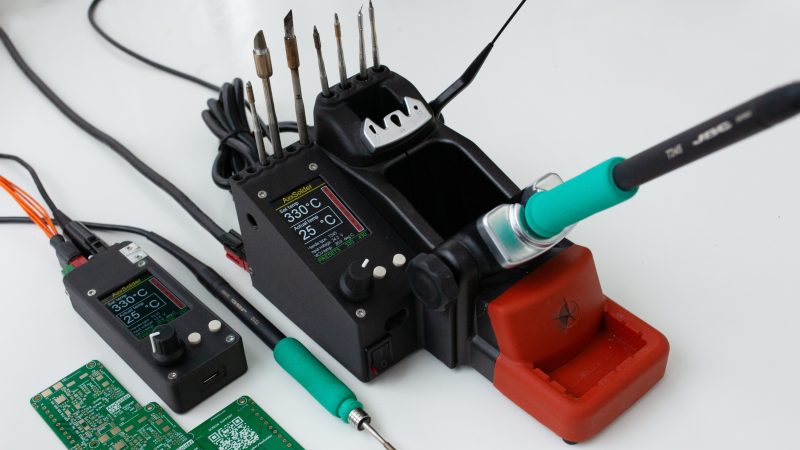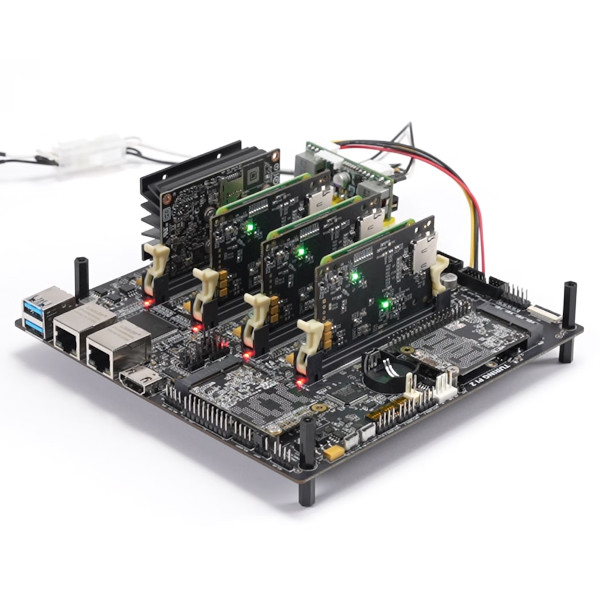If you’re big into the soldering iron scene, you’ve probably heard of the AxxSolder project. Now, it’s been updated with a whole host of nifty new features. It’s AxxSolder 3.0!
If you’re not intimately familiar with AxxSolder, it’s an open-source iron design based around the popular JBC soldering iron tips. Relying on the STM32G431CBT6 to run the show, it comes in two versions—a lightweight portable design, and a desktop version based around the JBC ADS soldering iron stand. So far, so familiar.
The new 3.0 version adds new functionality, however. Where the previous model ran off any old DC power source from 9 to 26 volts, the new version can run off a USB Power Delivery supply. Thus, you can grab any old USB-PD device, like a laptop charger, and run your iron off that.
The new version also uses a larger color TFT screen with some buttons added on as an improved user interface. Thermal performance is improved, and it’s additionally capable of measuring the current draw by the tip, so you can monitor the performance of the iron in great detail.
We’ve featured the AxxSolder project previously, too, along with some other great soldering iron projects. If you reckon you’ve just designed the hottest new soldering tool yourself, let us know about it!

















Seems umm expensive.
Yeah it doesn’t seem much better than a pinecil but is significantly more expensive. From a quick look on the GitHub it doesn’t seem to list a max power either, it just says the max power is cartridge dependant.
It looks way more ergonomic than a pinecile.. but yeah, otherwise it doesn’t seems to add much… for a travel setup, I’d take the more compact and still great pinecile… for a fixed station, had I none, that one looks way better.
on my last job we had multiple of the JBC soldering irons. They are very nice. They are very familiar to the pinecil, as they have the element and sensor in/near the tip. Have a very quick heat up time and sleep mode like the pinecil. The overall build quality is a lot higher. It is a very comfortable iron to keep soldering all day, day in day out. Just a lot more expensive then the Pinecil.
Max heating power is currently software limited to:
130W for T245
65W for T210
22W for NT115
That’s what I feel comfortable with, but as it is open source you could modify the firmware and go higher if you wish.. (dare)
Cool project. I like my Metcal/Thermaltronics tool.
Why the complexity, give me an analog pot and a power switch.
What about the PID temperature control?
The PID temp control is really a game changer. Unfortunately you don’t know what you’re missing till you actually use one.
$140? How is it any better than a Hakko?
@Lewin Day said: “Where the previous model ran off any old DC power source from 9 to 26 volts, the new version can run off a USB Power Delivery supply. Thus, you can grab any old USB-PD device, like a laptop charger, and run your iron off that.”
The AxxSolder site says “The hardware takes a DC input source of 9-24V OR a USB-C Power Delivery source.” Note the OR in CAPS emphasasized by the Author, not me. I need to look more closely at the schematic, but I’m pretty sure with the same board you can use 9-24 VDC input OR (not AND/OR) USB PD input.
Either way, IMO this iron controller looks sweet. But at EU 140.00 ($150.85 USD) plus shipping for a populated board only, it seems a bit steep. But then again, look at the price of the “JCB” iron elements the controller is supposed to interface with – oof! But at that price, I bet there are plenty of low-cost Chinese fakes ;-)
Indeed, with the same board you can use either 9-24V DC OR a USB PD. Does not make sense to use both at the same time. There is an ideal diode preventing over-voltage on the USB-PD source in case you would plug in a USB-PD while powering from a 24V DC source at the same time.
As the project is open source you could also build the AxxSolder yourself and remove some of the protection features to save on cost. There are plenty of Forks on the GitHub page where people are modifying the AxxSolder to suit their specific needs.